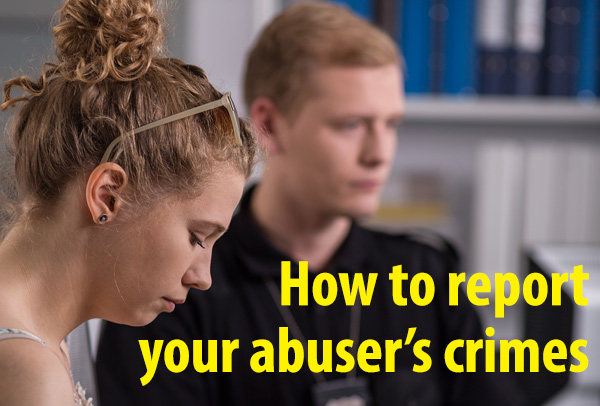
About this course
You’re dealing with an abuser whose behavior is morally wrong. In fact, you believe this person’s actions are criminal. Did he or she actually violate the law? How can you convince the police to investigate?
In this webinar, Stacey Elliott, NYPD (retired), teaches you how to report crimes that abusers usually commit. Here’s what you need to understand: When you approach the police to make a complaint, they are observing your actions, behavior and mental state to determine your credibility. And, they are trained to listen for key words as you tell your story. Using the correct words can make or break whether an incident is designated as a crime. Learn exactly how to present yourself to the police and what to say so that the cops are inclined to believe you.
Highlights
- Explanations of 13 crimes often experienced by victims of abuse
- How to identify crimes that your abuser may have committed
- What to prepare prior to reporting a crime
- How to explain your experience to law enforcement
- How to identify a competent police officer and what to do if they aren’t
About the instructor Stacey Elliott
 Stacey Elliott is a former New York City police officer. She spent 17 years as a patrol officer, responding to crimes and emergency situations. Her responsibilities included issuing summonses, processing arrests, writing reports, attending court, providing security, directing traffic, and investigating moving violations and motor vehicle accidents. Stacey completed training in cultural sensitivity, sound level meter, prostitution, chemical ordinance, biological and radiological awareness/counter-terrorism, radiation meter, individual terrorism awareness/combat, crime prevention and firearms proficiency. As a crime prevention patrol officer, she delivered crime prevention lectures at schools, community centers, community council meetings, nursing homes, and religious and private organizations. Stacey retired from the NYPD in 2017.
Stacey Elliott is a former New York City police officer. She spent 17 years as a patrol officer, responding to crimes and emergency situations. Her responsibilities included issuing summonses, processing arrests, writing reports, attending court, providing security, directing traffic, and investigating moving violations and motor vehicle accidents. Stacey completed training in cultural sensitivity, sound level meter, prostitution, chemical ordinance, biological and radiological awareness/counter-terrorism, radiation meter, individual terrorism awareness/combat, crime prevention and firearms proficiency. As a crime prevention patrol officer, she delivered crime prevention lectures at schools, community centers, community council meetings, nursing homes, and religious and private organizations. Stacey retired from the NYPD in 2017.
Cost and credits
The cost for this course is only $25 for 60 minutes of instruction. Once you purchase the course, you can access it online as long and as often as you want.
Although this course does not award continuing education credits, you will be able to download a certificate of achievement upon completion.
Learning objectives
In this webinar you will learn:
- Common crimes experienced by victims of abuse
- How to look up crimes and determine if they relate to your situation
- How to effectively report crimes to law enforcement
- How to describe crimes using the key words police officers listen for
- What to expect if you go to court
Program agenda for How to report your abuser’s crimes so the police take you seriously
55 minutes instruction
- What to prepare prior to reporting a crime
- Important definitions of crime-reporting terms
- Crimes and legal definitions
- Common crimes of abuse
- Unlawful imprisonment
- Kidnapping
- Harassment
- Stalking
- Reckless endangerment
- Menacing
- Assault
- Criminal mischief
- Larceny and robbery
- Endangering the welfare of a child
- Non-support of a child
- Fraud
- Sex crimes
- Criminal law resources
- All legal resources should be viewed as a puzzle
- Crimes and legal definitions – putting the puzzle together
- Explaining your experience to law enforcement
- Legal channels
- How to identify a competent police officer and what to do if they aren’t
- Find an attorney who understands personality disorders
- Dealing with trauma and the legal system
- Be wise as a serpent and peaceful as a dove
5 minutes questions and answers
When you report your abuser to the police, you must present yourself as credible and use key words as you describe what happened. Learn how, so cops are inclined to believe you.
Customer reviews
Add your review — click and scroll down


The webinar was informative and I learned to see my mistakes and the importance of filing police reports.
I was ill advised by my lawyer whom did not have experience to advise me in how important it would have been to my case if I filed police reports. Legal advice from a lawyer will not protect you, only law inforcement can help you. Therefore, learn how to file a report! If I had this knowledge four years ago, the X would be behind bars, where she belongs.
Due to my being uneducated about law inforcement the X is free to destroy the un-informed.
We must all learn about the ills and dangers of the preditor, the deranged personalities of those who lack remorse and empathy.
I highly recommend this course.
Anonymous for my safety.